Comprehensive Skills Every Clinical Educator Must Achieve Proficiency In
In the realm of healthcare education, a set of key skills is indispensable for clinical educators to foster the growth of competent professionals. These skills encompass communication, critical thinking, teamwork, empathy, professionalism, and adaptability, among others.
- Communication Skills: Effective communication is the cornerstone of clinical education. Clinical educators must be adept at conveying complex medical concepts in accessible ways, actively listening to students, and providing constructive feedback. Moreover, they should be able to communicate effectively with patients, using understandable terms to improve outcomes.
- Critical Thinking and Problem-Solving: Clinical educators play a pivotal role in guiding learners in analytical reasoning and clinical decision-making. They must demonstrate these skills themselves and help students manage complex healthcare situations with sound judgment.
- Teamwork and Interpersonal Skills: Collaboration among students and healthcare professionals is essential. Clinical educators facilitate this by building trust, rapport, and effective interdisciplinary care.
- Professionalism and Ethics: Clinical educators should model integrity, responsibility, and ethical behavior, fostering these values in learners to build patient trust.
- Empathy and Emotional Intelligence: Understanding and responding to patients' and learners' feelings enhances patient-centered education and supportive learning environments.
- Adaptability and Resilience: The healthcare environment is dynamic, and educators must adapt teaching approaches and maintain resilience in the face of challenges.
- Attention to Detail and Clinical Competence: Clinical educators need strong clinical skills to demonstrate procedures accurately, ensure patient safety, and supervise learners effectively.
- Use of Technology and Workflow Efficiency: Familiarity with clinical technologies and efficient workflow teaching are increasingly important for modern clinical education.
These skills collectively support the development of competent healthcare professionals capable of delivering safe, effective patient care. Frameworks like the AAMC Core Competencies and best practice training strategies in clinical settings emphasize these skills.
Maintaining up-to-date clinical knowledge helps build credibility and trust among students, as clinical educators are looked upon as models of professional excellence. Investing in these areas can multiply your impact and shape the future of healthcare.
- In the realm of education-and-self-development, focusing on personal-growth through communication skills could lead to improved interactions between educators and learners, fostering a stronger learning environment.
- Being aware of community news, and taking the opportunity to educate learners about environmental concerns within their locality could inspire a sense of responsibility towards preserving the environment, promoting a sustainable future.
- Staying updated on educational trends and events related to education, such as workshops, seminars, and webinars, offers opportunities for continuous learning and professional development, leading to more effective teaching methods.




